Blog
Twitter metrics from a Public Health Conference in South Africa – #PHASA2018
- November 3, 2018
- Posted by: admin
- Category: Live-Tweeting Medical Conferences


Twitter metrics from a Public Health Conference in South Africa – #PHASA2018
The Public Health Association of South Africa’s Annual Conference (#PHASA2018) took place between 10-12 September 2018 in the Free State, South Africa. The theme for this year’s event was Health for All in commemoration of the World Health Organisation’s (WHO) 70th-Anniversary and the signing of the Alma-Ata Declaration in 1978 which was modelled around access to basic health services being affirmed as a fundamental human right. The Alma-Ata further promoted providing health care services using “Primary Health Care” (PHC), which involved universal, community-based preventive and curative services, with substantial community involvement. Much of the focus of the #PHASA2018 event, therefore, was on achieving Universal Health Coverage (UHC) and in particular, debates took place around the National Health Insurance in South Africa (NHI) with a special explanation by the Honourable Health Minister Dr Aaron Motsoaledi on day three, Wednesday the 12th of September 2018. Twitter was an important tool to disseminate these conversations at #PHASA2018, not only because this open platform creates an opportunity for the greater public to engage, but also because we could record the Tweet data using the registered hashtag for research and development purposes on Symplur. Transcripts from medical events such as #PHASA2018 are useful to government and other organisations that rely on data but are unable to attend multiple events in different parts of the country or globe. Conference delegates may also find it helpful to have access to the conversation data after an event, especially if there were different breakout sessions. Many medical conferences abroad such as the 2017 American Society of Radiation Oncology (#ASTRO17) have successfully adopted Twitter as a tool to expand their reach [1], the Health Information Management Systems Society Conference 2018 (#HIMSS18) although well-attended by over 44 000 attendees is another valuable example which captured 119,000 tweets over the course of the five-day event held in Las Vegas [2]. Hashtags on social media platforms like Twitter help organise data into clusters which are referred to in Information Technology (IT) as metadata. In layman terms, hashtags help to refine big data for analysis on social media. South Africa has yet to realise hashtag functionality and potential for healthcare [3].
Background
hcsm is an acronym which is recognised in over 30 countries globally as Healthcare Communications and Social Media and represents the ethical and technical use of the web and social media platforms to share information, debate health policy, promote healthy behaviours, engage with the public as well as educate and interact with patients, caregivers, students and colleagues. Social media includes electronic communications shared in virtual communities and networks. In recent years, medical professionals and trainees have used social media to promote medical education, networking, scientific communication and more. Twitter is a microblogging social media network within the web 2.0 landscape where users compose short 280 character messages known as “Tweets” and is a popular platform for medical professionals to “live-tweet” at events by posting real-time updates using a specific hashtag [4]. The popularity of the Twitter platform for healthcare has expanded over recent years. Unlike Facebook, where privacy settings dictate the visibility of the status updates, Twitter works on a more open and accessible system [5], this makes it possible to reach a much wider, global audience. It also makes data aggregation easier when extracting it from an open network compared to closed groups like those on Facebook or Linkedin. Open platforms like Twitter make it more financially feasible to aggregate data through analytics platforms like Symplur, FollowtheHashtag, NodeXL and Hootsuite.
Methods
The hashtag #PHASA2018 was assigned to the Public Health Association of South Africa Conference 2018 and registered by hcsmSA (Healthcare Communications and Social Media South Africa) on the Symplur Hashtag Project. hcsmSA also implemented a Social Media Influencer Programme offering 5 scholarships to public stakeholders from diverse backgrounds in an effort to promote the use of the hashtag before, during and after the event as well as to set a precedent for conference attendees and external online followers. The #PHASA2018 Influencer Programme was announced through PHASA using its membership database as well as on the hcsmSA.org website (Article) and in two separate articles courtesy of eHealthNews South Africa (Article 1, Article 2). The #PHASA2018 influencers main duties were to share tweets from separate areas of the event so that the dissemination of information was varied and evenly distributed, they were also assigned to encourage the use of the hashtag among attendees and online to their own followers. hcsmSA further arranged and moderated a 60-minute Twitter chat with the 5 appointed scholars as well as 2 executive members of the Public Health Association of South Africa on the 4th of September 2018 shortly before the event to promote the use of the hashtag, create awareness and promote the theme using a blog containing questions (Twitter Chat Blog). The conference organisers were advised to prominently advertise the #PHASA2018 hashtag on all of their marketing material at the event including the slide holders on stage. Metrics were gathered from Symplur Signals and our colleague Dr Graham Mackenzie (@gmacscotland) further contributed through the use of NodeXL, FollowtheHashtag and Wakelet. hcsmSA recommended to the organisers that the #PHASA2018 hashtag continue being used after the event to share Tweets relating to topics around Public Health in South Africa until the 2019 event in order to build common knowledge about the hashtag as well as to enable the further capture of sentiment on Symplur during the course of the year.
Data Analysis
Data analysis of #PHASA2018 using Symplur Signals was taken between 9 September 2018, 21:00 SAST – 12 September 2018, 21:00 SAST.
Summary:
A total of 4539 Tweets, 240 users and 4 292 954 Impressions was measured during the 3 day period.


Influencers by number of Tweets
The top tweeter with the handle @MimmieMatsanga who was assigned as a Social Media Influencer accounted for over 14.6% of the total tweets, and the top 12 tweeters accounted for over 74.18% of the total volume of 240 users.
Top 12 tweeters were:
@MimmieMatsanga – 674 Tweets (hcsmSA Influencer)
@rene_sparks – 657 Tweets (hcsmSA Influencer)
@blestab – 584 Tweets (hcsmSA Influencer)
@Isobel_Ndoro – 384 Tweets (hcsmSA Influencer)
@MmaphehliM – 195 Tweets
@HannelieMeyer – 167 Tweets
@Marietj72675939 – 148 Tweets (hcsmSA Influencer)
@hcsmSA – 140 Tweets
@ashageorge72 – 114 Tweets
@MahlabaK – 99 Tweets
@SMU_PHPM – 93 Tweets
@SOPHUWC – 83 Tweets
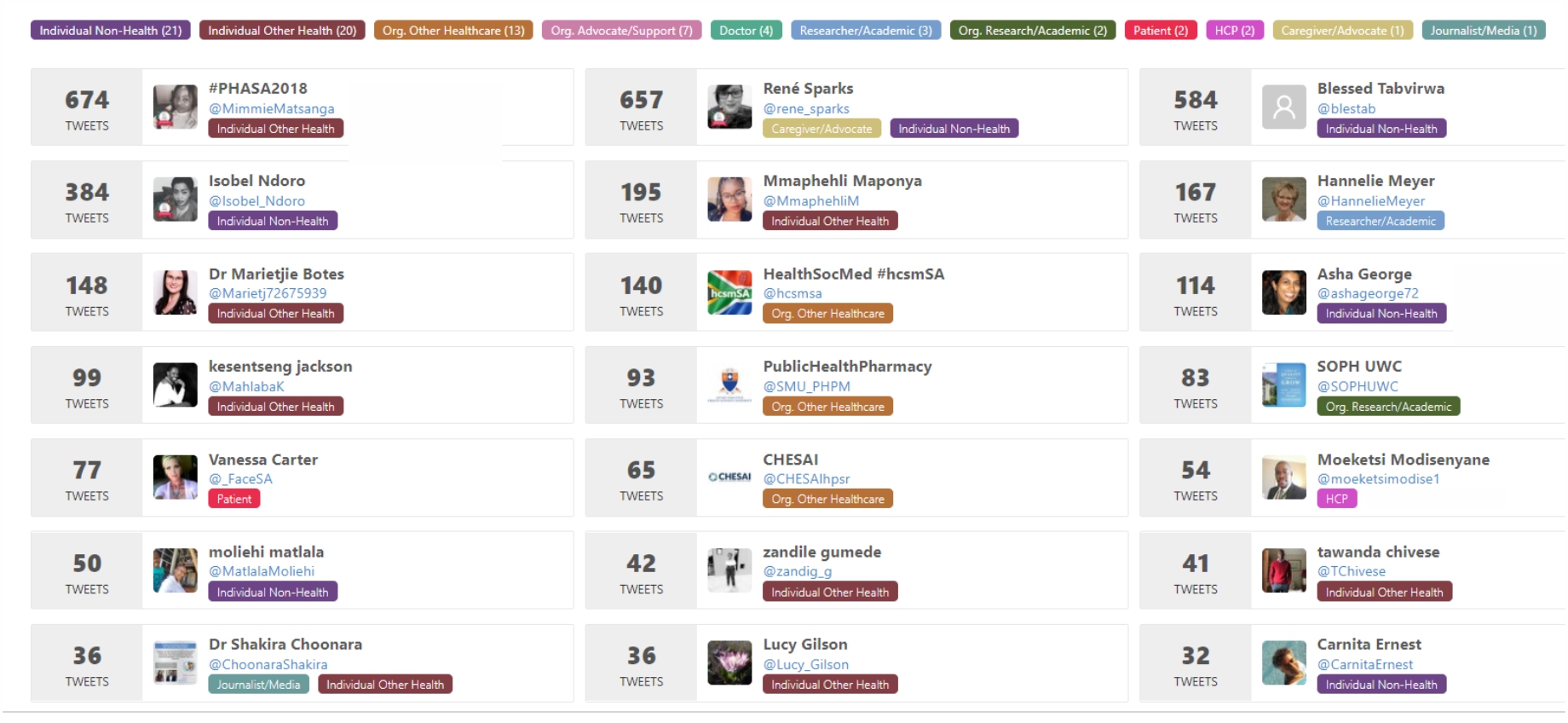
Visual Data Analysis
Tweet engagement rates are generally reported amongst modern marketing professionals to be 35% higher when they contain an image, photo or video [6], therefore it should be encouraged at medical events that hope to expand their public reach and participation metrics. The following Symplur Signals data report details and visualises photos shared at the Public Health Association of South Africa Conference between 9 September 2018, 21:00 SAST – 12 September 2018, 21:00 SAST and are sorted by the most shares using the hashtag #PHASA2018:
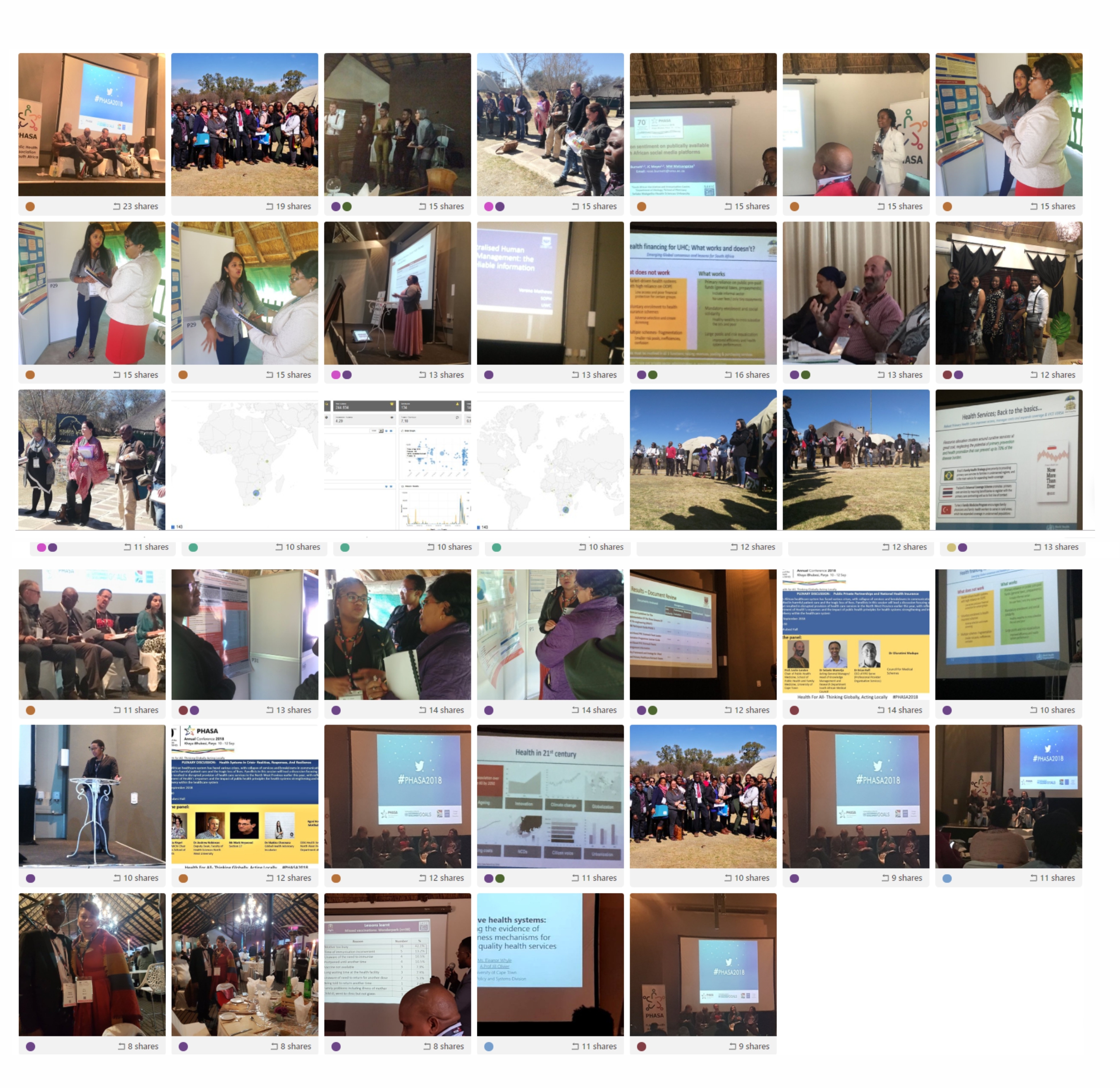
Network Analysis
The Symplur Signals Network Analysis graph showing the Twitter users most central to the conversation. The larger the node, the more frequently mentioned the user is. Edges between nodes indicate direct communications between the users around the hashtag #PHASA2018.
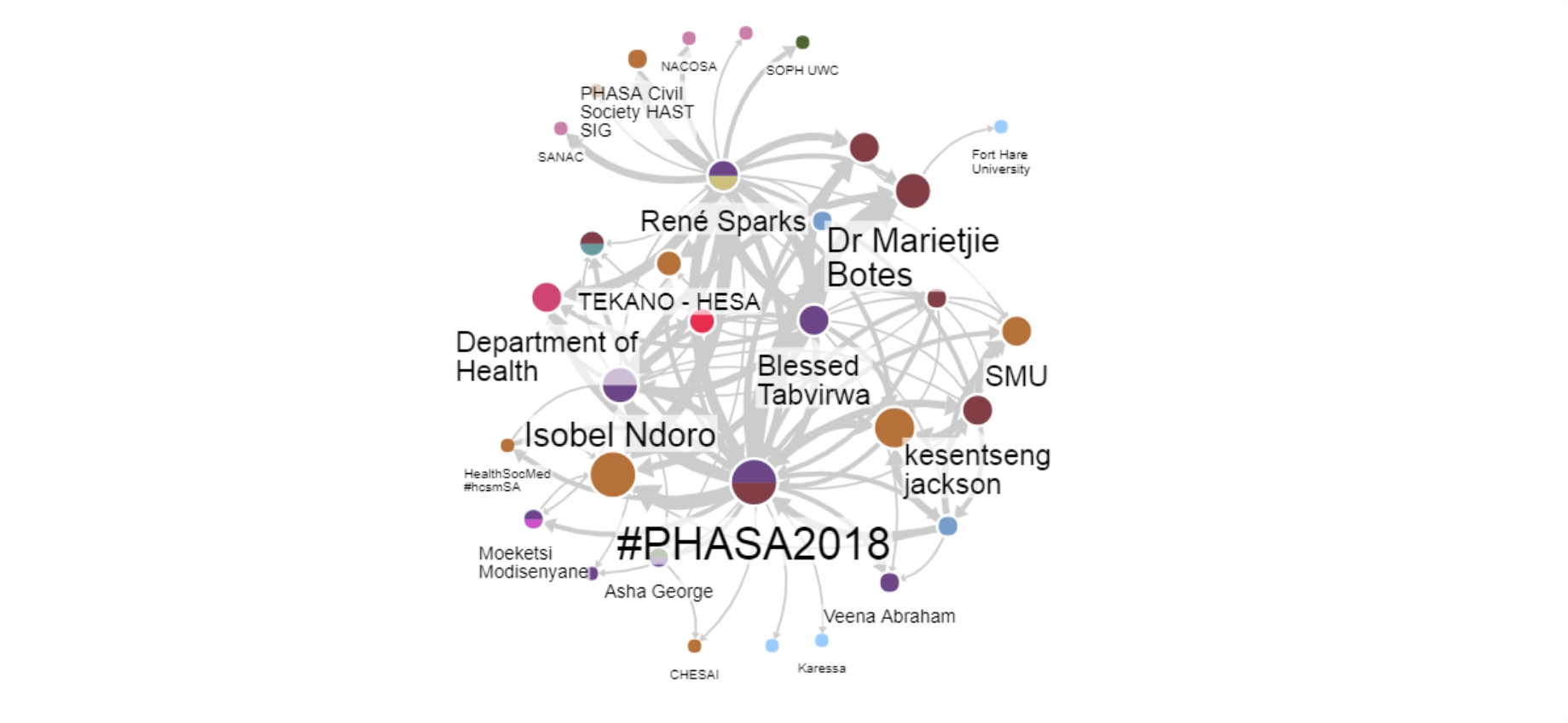
Transcripts
A transcript of both the Twitter chat held on the 4th of September 2018 using the hashtag #PHASA2018 and the conference between 10-12 September was recorded by Symplur. A transcript is useful for conference organisers to obtain sentiment about their event as well as for policymakers, innovators, researchers, academics and other stakeholders interested in discussions taking place around healthcare. The transcript is open to the public on Symplur for 30 days following the event (#PHASA2018 Transcript Twitter Chat, #PHASA2018 Transcript Conference).
Comparative Metrics
As a comparison, datasets were extracted from NodeXL courtesy of Dr Graham Mackenzie (@gmacscotland) Public Health Scotland which represented a network of 469 Twitter users whose tweets contained the hashtag “#PHASA2018”, or who were replied to or mentioned in those tweets. The tweets in the network were tweeted over the 10-day, 3-hour, 36-minute period from Monday, 03 September 2018 at 12:40 UTC to Thursday, 13 September 2018 at 16:16 UTC (Node XL Report). A further report provided by Dr Mackenzie was created showing the top tweets summarised in Wakelet containing data from FollowtheHashtag (Wakelet Report).
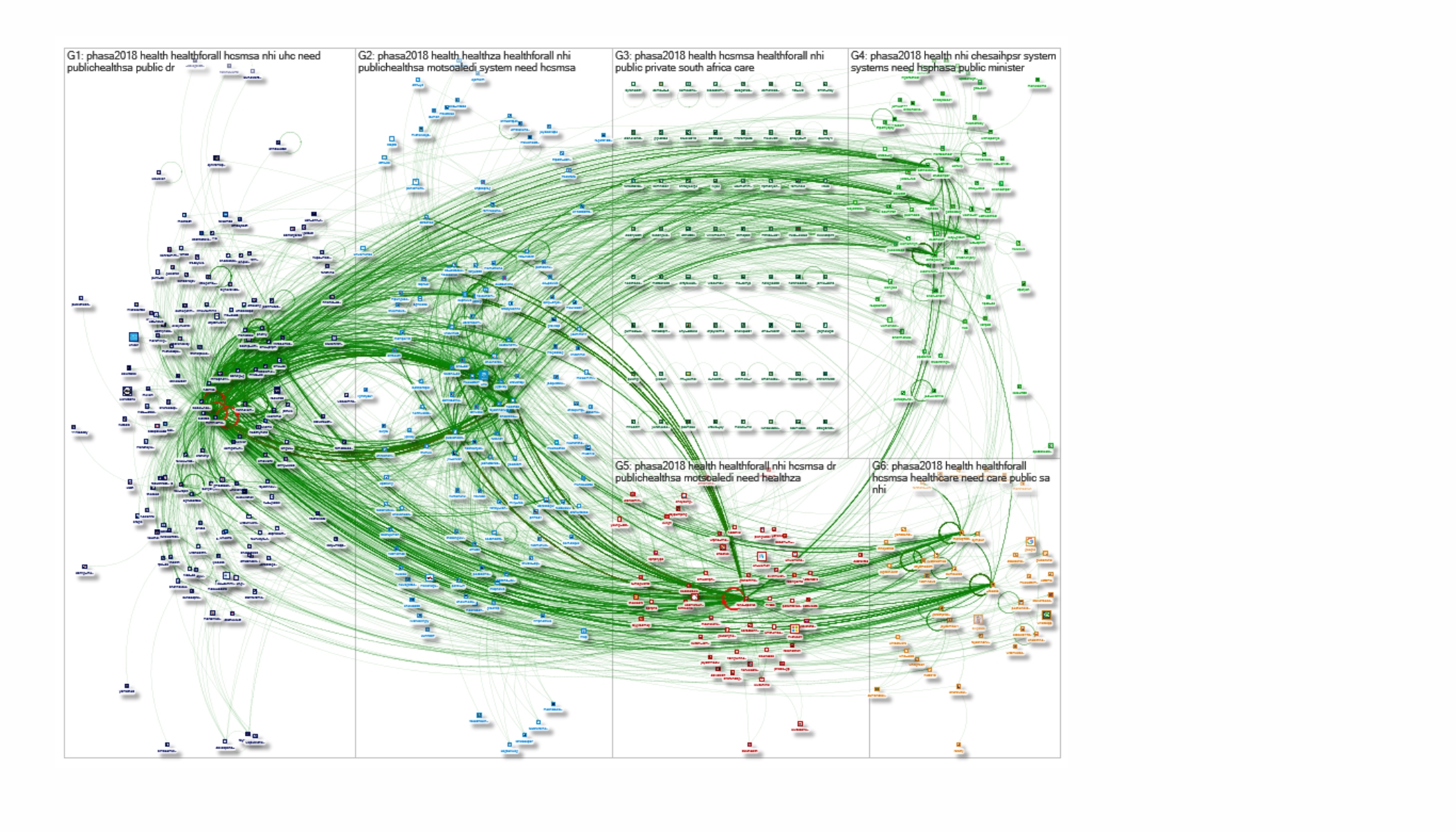
Data from NodeXL confirmed the top influencers of #PHASA2018 during the date period of 3 – 13 September:
@mimmiematsanga (hcsmSA Influencer)
@rene_sparks (hcsmSA Influencer)
@blestab (hcsmSA Influencer)
@publichealthsa
@healthza
@isobel_ndoro (hcsmSA Influencer)
@chesaihpsr
@choonarashakira
@hcsmsa
@sophuwc
Top hashtags:
#PHASA2018
#healthforall
#hcsmSA
#nhi
#uhc
#sdg3
#publichealth
#healthcare
Additional data extracted from www.followthehashtag.com demonstrated that 80% of tweeters were female and 20% were male. Metrics further illustrated that Tweeters were predominantly tweeting from South Africa, however other regions included the United States, United Kingdom and various regions of Africa. [7]
Comparison with #PHASA2017
When comparing Tweet data to the previous Public Health Association of South Africa conference which took place in Johannesburg between the 4th – 7th of September 2017 attended by a slightly higher number of delegates (260 in Johannesburg compared to 200 in Parys) using the hashtag #PHASA2017, data extracted from Symplur analytics showed that online engagement had improved by roughly 200% for tweets in 2018 using the #PHASA2018 hashtag from 1561 to 4539, 21.3% for user engagement from 192 to 240 and 45% for impressions from 2 586 285 to 4 292 954. The following summary was retrieved along with an image showing influencers by tweets:
Tweets: 1561
Retweets: 1209
Users: 192
Impressions: 2 586 285
Articles: 95
Visuals: 1591
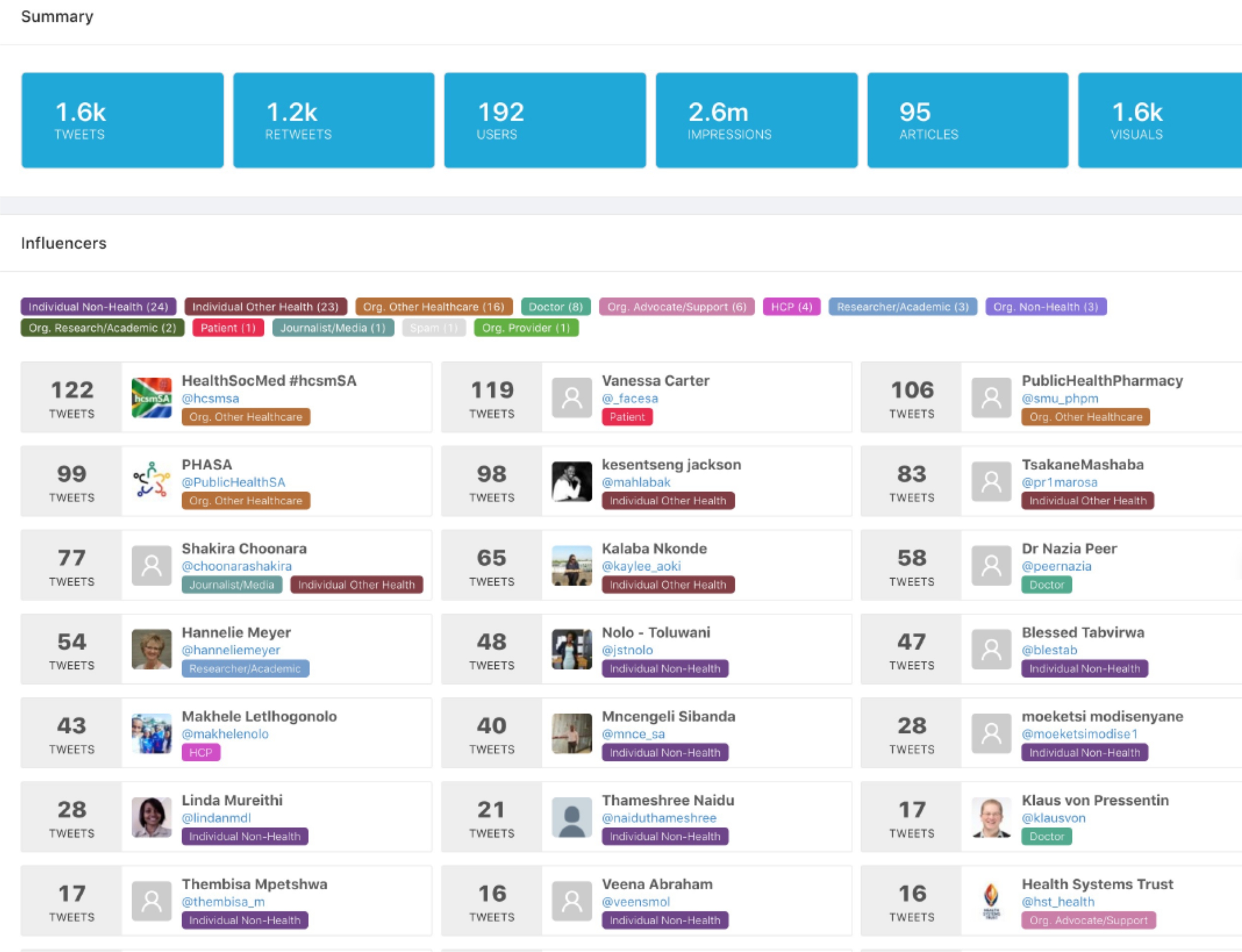
Conclusion
From time spent at the #PHASA2018 conference, our experience was that the use of social media platforms like Twitter remains an ethical concern for many stakeholders at medical events in South Africa, especially for professional users who fear legal repercussions. In some cases, not understanding the relevance of information dissemination on the web or how to participate using platforms like Twitter also contribute to a lower level of engagement. Another issue we believe may be related to the incorrect use of health hashtags which are central to how data is aggregated online. Hashtags act as an indexing tool otherwise known in the IT world as metadata. When disseminating information without the correct hashtag it isn’t possible to measure conversations by a group, instead, Tweet data is fragmented. Many stakeholders weren’t aware that a global health hashtag index is freely available on Symplur’s Health Hashtag Project, therefore they don’t reference that data before sharing a Tweet. By implementing the Social Media Influencer Programme, we were able to teach five individuals this year about the importance of health hashtags so they could have an impact on others and through that motivate the correct use of the hashtag at the event. Further, by improving the marketing of the hashtag we believe it also contributed to a 200% improvement demonstrated in the Symplur data from the previous year (#PHASA2017). When using digital platforms at medical events such as #PHASA2018, it is emphasised that caution should be practised around issues relating to sharing research in terms of intellectual property rights, especially when a speaker has asked delegates not to, however, when used strategically and professionally, research that otherwise would have only been presented to a few people in a room can reach a much wider scientific and public audience. Presenters are advised to announce whether research can be tweeted outside a medical event or not. Because social platforms like Facebook and Linkedin have more stringent privacy rules, they don’t offer the same opportunity Twitter does to disseminate information at a medical event to a global world. They also don’t offer the same tools to motivate public conversation such as through a Twitter chat. The recording of a Twitter transcript between diverse stakeholders also provides an invaluable mechanism to collect conversation data for research and development. For LMICs like South Africa, especially in the area of Public Health and system reform, we believe utilising these freely available tools correctly shouldn’t continue to remain an oversight, especially at important medical events like PHASA.
Author
Vanessa Carter, Stanford University e-Patient Scholar for Antibiotic Resistance. Founder of #hcsmSA.
References
1. https://www.symplur.com/hcsmr/the-2017-american-society-of-radiation-oncology-astro-annual-meeting-taking-a-deeper-dive-into-social-media/
2.https://www.himss.org/news/himss18-story-told-through-social-media
3.http://www.hcsmsa.co.za/composingtweets/
4.https://www.sciencedirect.com/science/article/pii/S2213294518300073?via%3Dihub
5. https://www.linkedin.com/pulse/20140502225851-1282856-twitter-s-new-role-in-the-healthcare-industry/
6.https://www.falcon.io/insights-hub/topics/social-media-strategy/how-to-write-tweets-that-get-more-engagement/
7.https://scotpublichealthdotcom.files.wordpress.com/2018/09/export_pdf_phasa2018_2018_09_12_19_39_05.pdf
